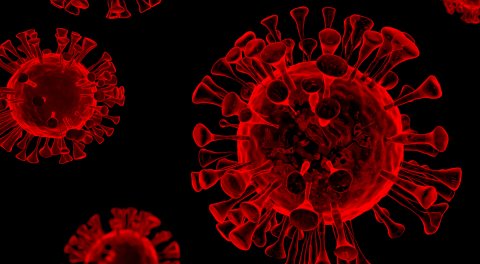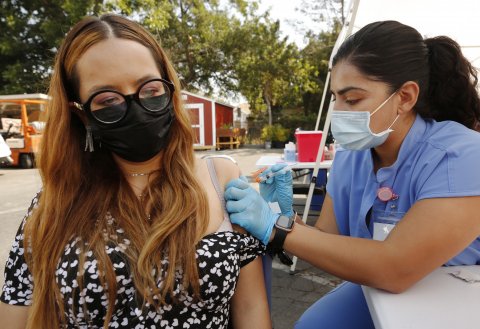One of the most frustrating aspects of the current pandemic has been keeping up with the latest public health advice on how to cope with the ever-mutating coronavirus.
Interpreting broad public-health advice to suit your own specific circumstances often involves weighing vague notions of risk. Vaccines offer good protection, but if levels of virus circulating in the community rise, the absolute risk of getting sick rises for everybody, vaccinated and unvaccinated alike.

The rise of Delta, which is far more easily transmitted from person to person than previous strains of the virus, has made going out in public riskier. That's one reason why the Centers for Disease Control and Prevention (CDC) recently changed its masking recommendations—it now advises vaccinated people in areas with high levels of virus to wear a mask indoors. Figuring out when to take risks and when not to is largely a matter of individual circumstance and preference. For instance, people with weakened immune systems should be more cautious than those with robust immune systems. Here are answers to some other common questions:
Q: How great is the risk of getting sick if you've gotten the vaccine?
It depends on the vaccine. A study published in the New England Journal of Medicine in July showed that the two-shot Pfizer mRNA vaccine was 88 percent effective in preventing illness due to the Delta variant, down from 93.7 percent for the Alpha variant. The Moderna mRNA shot is thought to offer similar protection. The study found that the Astra-Zeneca vaccine was 67 percent effective against Delta, as opposed to 74.5 for Alpha.
Q: If vaccinated people can still be infected, should they worry about being able to transmit the virus to others?
Yes, but not as much as unvaccinated people should. According to internal CDC documents recently obtained by The Washington Post, vaccinated people who have been infected with the Delta variant may spread the virus as efficiently as unvaccinated people who are infected. Delta tends to concentrate in the nose and throat, which is why the CDC wants everyone to mask up. However, because vaccinated people tend to have stronger immune responses to the virus, they are probably contagious for only a short time—though this scenario has not been studied rigorously.
Q: Can vaccinated people who show symptoms develop long-haul COVID-19?
Little is known about long-haul COVID. In a recent study of health care workers, 19 percent of vaccinated people who got sick still had symptoms after six weeks. Keep in mind that this is only one study with relatively few participants, so firm conclusions will have to wait for more data.
Q: When will children under the age of 12 be eligible for a shot?
Current estimates range from as little as a month or two to well into 2022. On the far side of the range: FDA officials say they expect children under 12 to be eligible for vaccination by midwinter, after another four to six months of clinical trials. Pfizer, though, is more optimistic. In June, it began a study of 4,500 kids aged 5-to-11 in the U.S., Poland, Finland and Spain and hopes to have enough data collected by September to ask officials for an emergency use authorization.
Q: How do doctors determine which variant you have?
COVID-19 tests don't identify variants. To find out how prevalent a variant is, the CDC takes samples, identifies them by sequencing their genetic material and then estimates what proportion of infections a given variant accounts for.
Q: Are the symptoms different between the variants?
Symptoms from many variants are similar to those of the original virus—fever, dry cough, shortness of breath. However, Delta can also manifest more like a bad cold, with a runny nose, sore throat and headache. Recently, reports of loss of smell and taste have become less common, according to the Zoe Covid Symptom study.
Q: When does the immunity from the vaccine start to wane? Is it the same for mRNA vaccines and others?
Pfizer recently said that the effectiveness of its mRNA vaccine declines to 84 percent about four to six months after the second shot, based on an internal study that has not yet been peer reviewed. A study in the journal Nature suggested that the mRNA vaccines have potentially long-lasting immunity.

Q: Will everyone eventually need booster shots? Or only those who are elderly and/or immunocompromised?
It depends in part on what kind of variants arise in the future. For now, experts do not foresee a need for most healthy vaccinated people to get booster shots, but that could change. Public health officials have suggested that those with weakened immune systems may need to get boosters this winter.
Q: Is it safe to go back into an office to work?
Safe is a relative term. It depends on an individual's health, circumstances and tolerance for risk. In an office where everybody is vaccinated and virus levels in the community are low, the risk is small. In an office where many people are unvaccinated and virus levels are high, the risk can be many times higher. The risk for an unvaccinated person is always higher than for a vaccinated person. Vaccinated people who are immunocompromised or are caring for someone who is vulnerable at home may want to keep their potential exposure to the virus as low as possible—which means avoiding crowded, poorly ventilated rooms and wearing masks when indoors with others who may not be vaccinated. Because the Delta variant is so highly transmissible, the CDC now recommends mask wearing for everyone in indoor settings in regions where virus levels are high.
Q: In light of the Delta variant, should we be rethinking resuming regular activities like going to restaurants, sporting events, concerts, flying on planes, etc.?
Most vaccines still offer excellent protection. However, the risk goes up with exposure to the virus—and the Delta variant, with its high transmissibility, has ratcheted up the risk for all activities. Risk tolerance varies from one person to the next, but in general it's a good idea to be aware of situations that are likely to bring you into contact with high levels of virus. Crowded, stuffy bars are riskier than spacious, well ventilated restaurants. Airplanes usually have good ventilation, but you have to worry about that unmasked, unvaccinated person sitting next to you. If in doubt, wear a mask.

Q: If you've already had COVID-19 with mild symptoms, what are the benefits of getting the vaccine?
One big benefit of vaccination is that it reduces the overall level of virus in a population, which makes everyone safer. Some studies also suggest that vaccines provide better protection for longer than natural infection. For instance, a study in China, recently published in The Lancet, showed that only 40 percent of people who had gotten COVID-19 carried antibodies to the coronavirus months later.
Q: If you've already had COVID-19 and are getting the vaccine, do you need to get both shots?
Yes. A recent study in the U.K., published in Nature, found that a single shot of the Pfizer vaccine reduced illness from the Delta variant by 33 percent. Two weeks after the second shot, that protection rose to 88 percent.












